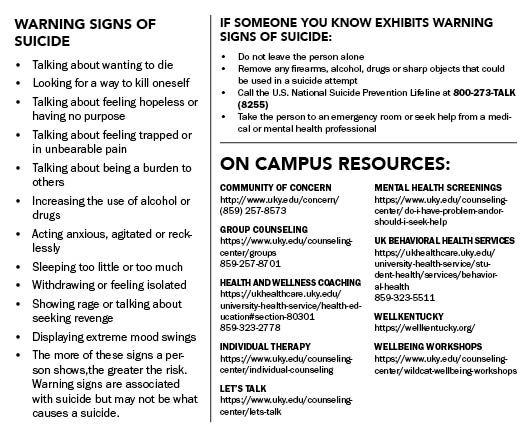We have to do better.
February 6, 2019
Alongside many students on UK’s campus, we on the Kernel editorial board are grieved over the recent suicide deaths on campus. Each time we lose a student, even when we don’t know them personally, we are reminded of the fragility of life and the importance of self-care and support systems.
For the person reading this, we hope you know that there are people who care for you, even if you don’t always feel that way. We hope you know that people care for you even if they don’t know you. That a stranger can love you and support you. That people believe in you. We hope you know that as human beings, our hearts ache for you. We hope you hear us when we say that your life matters and your unique self is an irreplaceable asset to our world. We see you, and we hear you.
Last September, during Suicide Prevention Awareness Month, the Kernel editorial board wrote to encourage students to prioritize self-care and fight the stigma against seeking help for mental health issues. At that time, we wrote about the rise of suicide risk on campus and encouraged our audience to seek help from both friends and professionals as well as staying available to others. That editorial is even more pertinent now as we mourn the loss of our fellow Wildcats and as we look to ways to keep this from happening again.
Now, as the pressure to be perfect weighs down on college students around the state and country, we come back to stress the importance of having an inward focus. Of realizing that a degree, good grades and a great job all mean very little if you’re not happy. Of knowing that it’s more important for you to be happy than for your family or peers to understand you.
After the recent suicides on campus, President Eli Capilouto sent a campus-wide email in which he wrote, “My hope is that everyone on our campus – no matter who you are, where you are from, what you look like, or what you believe – can know you are not alone.”
“You’re not alone.”
It’s a common phrase used to console survivors. It’s meant to console hurting hearts in the midst of tragedy and remind us that others like us have struggled with battles of the mind too and that we can triumph despite it all. Yet, we all see the world through different eyes and perception is the greatest form of reality. And the harsh reality is that many students on this campus do in fact feel alone, even though (or perhaps especially because) they are surrounded by 30,000 other students facing similar battles.
We have to do better.
Our campus system of support has many flaws. If you read the submitted op-ed in this paper, you’ll hear a first-hand account of how the institution’s support system has failed students on many levels, from not giving the right kind of support to being inaccessible. UK officials would do well to take the advice in that piece to heart. So often, students just need to share, and counselors should really listen to what kinds of interactions increase anxiety and what kinds actually help the individual they’re dealing with.
In addition to working to fix the flaws in the counseling system, officials on campus need to be more open with the employees and students about these issues. Students deserve to hear an honest and open discussion on mental health directly from their president. An email is fine sometimes, but when tragedies happen so publicly, they deserve an in-person response. Especially in the midst of technological separation that may increase feelings of isolation and loneliness, we need to hear and see a more sincere response from our school’s top officials.
Some faculty members have expressed uncertainty over the whole situation, not having been told details by the administration officials, who should be doing more to candidly discuss this important issue that affects so many people. While still supporting the privacy wishes of the closest families involved, they should be sharing sufficient details with the faculty and then with students. As many of us have likely experienced, a professor can be in a unique position to help students who are struggling. A well-placed word of encouragement or an assignment delay can lift students’ spirits. By trusting faculty members enough to give them details and train them to encourage students, UK’s administration can more effectively reach individual students who are struggling.
UK does have a lot of room to improve when it comes to mental health help. But we also have to do our part to defeat the stigma surrounding this serious issue by being brave enough to be open when we’re struggling. By not getting annoyed at the stranger who tries to chat with us in the library when we want to study. By listening to ourselves and to others. By going with a friend to seek help. By losing more sleep than usual to cry with a friend. By devoting the same energy to being in touch with our emotions that we do to getting good grades. By setting realistic standards for ourselves. By letting ourselves and our friends know that it’s OK to be sad, that all emotions take turns. And that’s healthy. And it doesn’t have to be the end of our corner of the world.
































































































































































